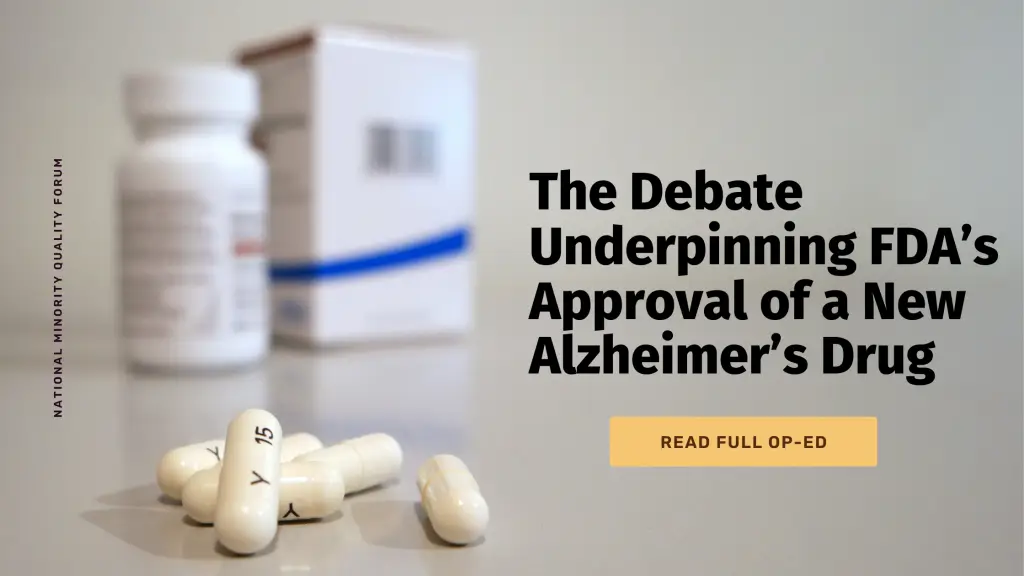
The controversy over the Food and Drug Administration’s use of its accelerated approval pathway to make a new treatment for Alzheimer’s disease available raises broader, fundamental issues about the purpose and management of our nation’s health care system. Those of us who rely on this system believe that its purpose is twofold: mitigate our risk – for going to the hospital, for a disability, for dying – and improve our quality of life. There are powerful voices, however, that have a profoundly different view.
Rather than managing patients’ risk, some are more focused on managing immediate health costs – in other words, financial risk. They do this by erecting barriers to treatment options that exist today and hindering advances in medical innovation that will provide better options in the future. The stark differences between the financial risk and patient risk approaches are, in fact, on display in this debate over the FDA’s accelerated approval pathway.
The FDA developed this pathway to make treatments available more quickly for severe and often life-threatening diseases where existing medical options are inadequate. It has been an enormous success, including being critical in saving the lives of people with HIV/AIDS, and benefiting patients afflicted with a variety of cancers and rare diseases. Under the pathway, therapies go through rigorous clinical trials – just like drugs that are reviewed through the traditional FDA approval pathway – but the trials study the effects of the therapy by using a “surrogate endpoint” such as a lab measure or the effect of the drug on the size of a tumor, instead of how long someone lives.
The accelerated approval pathway brings innovative therapies to bedsides faster. For many patients with serious diseases, this pathway gives treatment options where there were once none.
Those who care more about financial risk, unsurprisingly, find fault with the accelerated approval pathway. We’re seeing this in the controversy over the new Alzheimer’s treatment. Despite the hope that it brings to a rapidly growing number of Alzheimer’s patients and their families who have not seen a significant clinical achievement in this field in over two decades, many in the health care establishment are finding fault with the FDA’s accelerated approval designation. But this sniping isn’t new by any means.
The National Governors Association and individual states have asked the federal government to allow them to exclude accelerated approval drugs from state Medicaid formularies – essentially denying their poorest citizens access to innovative medicines – until additional clinical trials are completed.
The Institute for Clinical and Economic Review, an organization with influence over health care coverage and payment decisions, has suggested that accelerated approval drugs be price-controlled at marginal levels. This would have a discouraging effect on the development of breakthrough medicines.
And the Medicaid and CHIP Payment and Access Commission has recommended to Congress that it increase the level of mandated Medicaid rebates for accelerated approval drugs, effectively a backdoor approach to price controls that could have a deleterious effect on development of disease treatments.
These conflicting views over the accelerated approval concept represent a microcosm of the fundamental health care debate pitting patient risk against financial risk. We have inadequate treatment options for many serious diseases. We can slow-walk our way to finding solutions, controlling access to care as dictated by financial risk models, understanding that hundreds of thousands will have their lives cut short or their quality of life severely degraded as we meander and monitor the short-term financial bottom lines.
Or: We can realize that we are living in a golden age of medical innovation that is bringing cures for devastating diseases within our reach. If we are truly committed to mitigating patient risk, we understand that we have an obligation to bring new therapies in a system regulated by safety, efficacy and all deliberate speed. As we achieve cures and more effective treatments, the real savings in health care cost will be realized without the inequities bred by current-day financial risk models.
It is time to decide whether the guiding principle of our health care system is to manage financial risk or to mitigate patient risk and improve our collective health and societal well-being.
This op-ed is by National Minority Quality Forum President and CEO Dr. Gary A. Puckrein. It originally appeared in Morning Consult.
